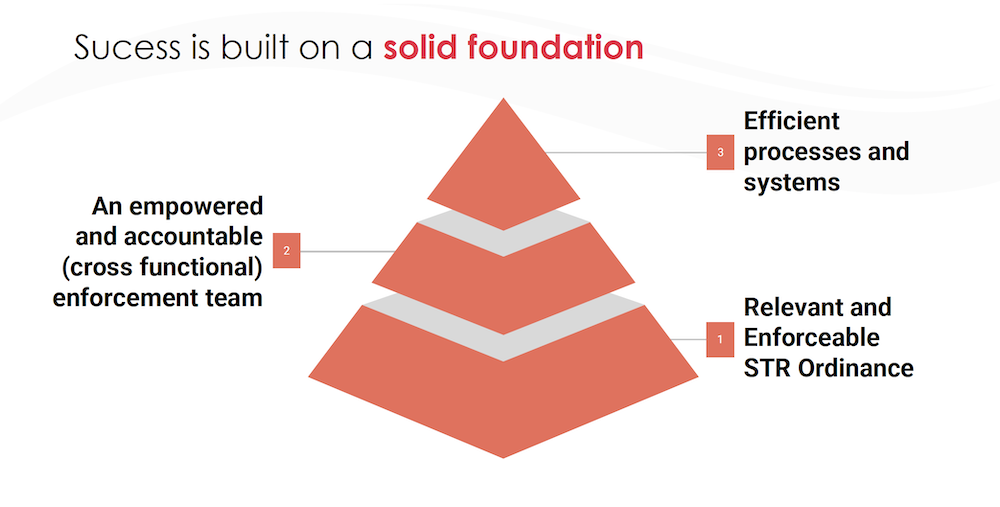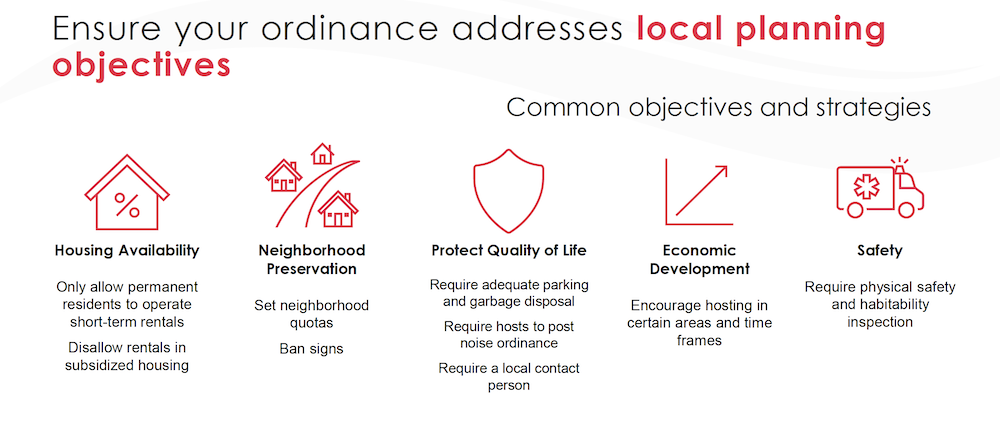Short-Term Rental Trends in the West
and How to Craft an Ordinance to Handle Them: Highlights From a GNAR Initiative Webinar
(This webinar originally aired on on May 5, 2021 as part of our, "How to Shred GNARLY Problems" Webinar Series)
"Dozens." "Hundreds." "We have no idea." These are a few of the answers communities gave when asked how many short-term rentals they have in their city.
In the last decade, short-term rentals (STRs) have grown from a cottage business to a multi-billion dollar industry, and they're here to stay. While the new sharing economy can bring economic benefits, STRs can also have detrimental effects on community character and housing inventory.
As part of our six-part "How to Shred GNARly Problems" webinar series this past spring, the GNAR Initiative partnered with our friends at Granicus and Host Compliance to put together a webinar all about short-term rentals. Using data gathered from over 100 short-term rental websites, they were able to paint a picture of the trends and trajectory short-term rentals have taken over the last few years, the crazy explosion COVID triggered in the industry, and ways communities can use ordinances and technology to try and get a handle on this growing sector. We encourage everyone to watch it here, but in the meantime, here are some of our highlights:
1) Without an enforceable STR registration and tracking program, communities might be missing out on substantial tax revenue.
Each STR website is different, and not all of them collect the tax revenue for the community. Having registration as part of the ordinance helps a community ensure they're capturing lost tax revenue, and can help fund the STR enforcement system. Additionally, the point of registration can be a great opportunity for STR host education about community values and expectations.
2) If you don't have an ordinance yet, don't go crazy. Sometimes when faced with the continued rapid growth of STRs, communities go from 0-100 on the regulation spectrum. This can cause significant amounts of push back and leads to a vicious (and potentially expensive) cycle of property management companies vs. community members. If you craft good ordinances, you can start to have a more healthy and balanced relationship with your STRs.
Sometimes when faced with the continued rapid growth of STRs, communities go from 0-100 on the regulation spectrum. This can cause significant amounts of push back and leads to a vicious (and potentially expensive) cycle of property management companies vs. community members. If you craft good ordinances, you can start to have a more healthy and balanced relationship with your STRs.
Start with the general plan to decide what your community is all about, and where you want to go. Draft an ordinance, put it out to the community, and have a community feedback process that includes STR hosts.
3) Simple is best.
Your ordinance has to be enforceable. Look at your resources to see if what you want to do is possible, and determine what tools you have at your disposal.
4) Enforcement is critical. A good enforcement team and technology can help.
Empowering your enforcement team helps ensure the ordinance is effective, because without enforcement the ordinance won't help accomplish the community's objectives. Host Compliance offers a paid software tool that can help communities track and manage STRs in their community. However, for communities just starting out who don't have an ordinance yet, they also offer a free STR evaluation to help you get an idea of how many STRs are in your community.
Don't set the bar too high for your community to enforce. If a challenge to the ordinance went to court, you want to make sure you have the best leg to stand on. Easily enforceable ordinances and evidence helps make that possible.
5) Make sure it reflects your community desires for the future.
Unite your own ordinances based on your unique community needs. What is your parking situation, street layout and housing limit? Assess your marketplace and integrate STRs into your community vision. They're here to stay, and planning with this reality in mind gives a community the most capacity to handle them.
6) Don't be afraid to issue citations!
Finally, don't be afraid to issue a citation! John Spuhler gives a great example from when he was mayor of Garden City, UT. A Utah state senator called him up and said one of his friends had just received a $7,500 fine from the city for running an illegal AirBnB. John presented the ordinance and evidence he had gathered to the senator, and the friend quickly got into compliance. Sometimes cities can be afraid to issue citations, but don't be! If your ordinance is strong and evidence is good, citations help show that you're serious, and can help protect your community from bad actors who put profit above the community.
We encourage you to watch the full webinar and Q&A on our YouTube channel.
CLICK HERE to learn more about the,
"How to Shred GNARly Problems: Tools, Techniques & Resources to Help Address Epic Housing Challenges" webinar series.


